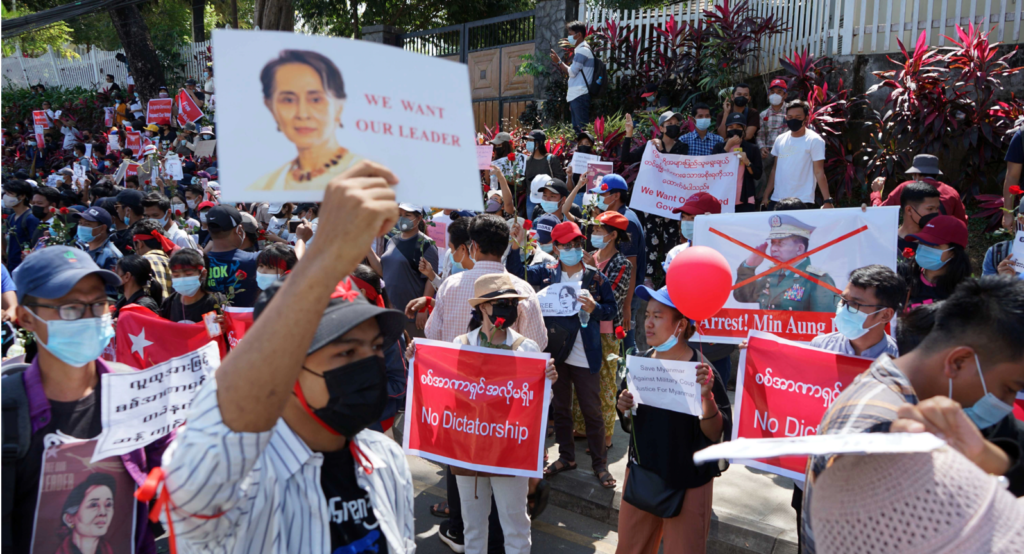
By: Poppy Doolan
On February 1, 2021, the Myanmar military took control of the government following the country’s general election and the landslide victory of Suu Kyi, of the National League for Democracy Party.[1] The military supported the losing party and claimed the election was unfairly won.[2] Suu Kyi was placed under house arrest, and the military’s Commander in Chief, Min Aung Hlaing, seized power.[3] The military’s notorious human rights violations and recent coup d’etat have caused many countries, including the United States, Canada, and the United Kingdom, to ramp up sanctions programs against Myanmar’s military and current leadership.[4]
On February 11, in response to the coup, the U.S. administration implemented a sanctions program primarily against military leadership in Myanmar.[5] The sanctions are designated for foreign persons that have “acted or purported to act for or on behalf of the military or security forces of Burma.”[6] Under the Office of Foreign Assets Control’s fifty percent rule, this designation also applies to entities which are fifty percent or greater owned (directly or indirectly) by an individual or individuals designated under the sanctions program.[7] This rule requires U.S. individuals and entities to conduct due diligence in researching who they are doing business with, and to identify the end-users of U.S. products and services overseas.[8] On February 18, the United Kingdom and Canada followed the U.S. sanctions against Myanmar in a coordinated effort, designating military officials as blocked persons under similar sanctions programs.[9] The international retaliation has two broad implications for businesses conducting business abroad.
First, the retaliation highlights President Biden’s policy priority of joining international allies to implement more targeted and effective sanctions programs, particularly to combat human rights abuses.[10] Prior to the implementation of the sanctions on Myanmar, President Biden had calls with many U.S. allies, including the United Kingdom, Canada, Mexico, Germany, France, and others, on coordinating efforts to rebuild “the muscles of democratic alliances.”[11] This cooperation might be utilized again to impose sanctions on China and Russia, and likely to facilitate a tougher stance on North Korea.[12]
Second, although the U.S. sanctions program is targeted mainly at members of the Myanmar military and defense sectors, U.S. persons and entities should be wary of doing business with entities in Myanmar.[13] The sanctions were strategic; the Myanmar military and related persons have a substantial stake in Myanmar’s economy through large conglomerates, most notably of them- Myanmar Economic Holdings Limited.[14] While President Biden’s sanctions may be targeted in terms of the individuals and entities listed on the Specially Designated Nationals and Blocked Persons (“SDN”) list, the list is not comprehensive and businesses can be fined for doing business with any person or entity that is “responsible for or complicit in, or to have directly or indirectly engaged or attempted to engage in” any of the activities listed in the executive order, including “serious human right abuse” or “policies that threaten the stability of Burma.”[15] Overall, President Biden’s strategy of international sanctions cooperation is likely to be successful in challenging serious human rights abusers. As a result, U.S. businesses should conduct due diligence and be cautious when dealing with individuals and entities connected with human rights violations, even if they are not yet on the SDN list.
[1] See Myanmar Coup: Aung San Suu Kyi Detained as Military Seizes Control, BBC News (Feb. 1, 2021), https://www.bbc.com/news/world-asia-55882489.
[2] Id.
[3] See Alice Cuddy, Myanmar Coup: What is Happening and Why?, BBC News (Feb. 24, 2021), https://www.bbc.com/news/world-asia-55902070.
[4] See Justin Tran, The UK and Canada Issue Sanctions on Myanmar, Clyde & Co. (Feb. 22, 2021), https://www.clydeco.com/en/insights/2021/02/the-uk-and-canada-issue-sanctions-on-myanmar.
[5] Id.
[6] Exec. Order No. 14,014, 86 Fed. Reg. 9429-32 (Feb. 12, 2021).
[7] Dep’t of the Treas., Revised Guidance on Entities Owned by Persons Whose Property and Interests in Property are Blocked (2014), https://home.treasury.gov/system/files/126/licensing_guidance.pdf.
[8] See id.
[9] See UK and Canada Impose Sanctions on Myanmar Generals After Coup, Reuters (Feb. 17, 2021), https://www.reuters.com/article/myanmar-politics-int/uk-and-canada-impose-sanctions-on-myanmar-generals-after-coup-idUSKBN2AI043.
[10] See Franco Ordoñez, Biden Looks to Move Beyond Trump’s ‘America First’ In 1st Foreign Policy Address, NPR (Feb. 4, 2021), https://www.npr.org/2021/02/04/963650814/america-next-biden-to-talk-about-foreign-policy-as-russia-myanmar-crises-flare.
[11] See id.
[12] See Biden Will Keep Using U.S. Sanctions as a Weapon But With a Sharper Aim, Reuters (Dec. 16, 2020), https://www.reuters.com/article/us-usa-sanctions-insight/biden-will-keep-using-u-s-sanctions-weapon-but-with-sharper-aim-sources-idUSKBN28Q1CV.
[13] Exec. Order No. 14,014, 86 Fed. Reg. 9429 (Feb. 12, 2021).
[14] See Adam M. Smith et al., New U.S. Sanctions and Export Controls Target Military Behind Coup in Myanmar, Gibson Dunn (Feb. 16, 2021), https://www.gibsondunn.com/new-us-sanctions-and-export-controls-target-military-behind-coup-in-myanmar/; Nicholas Turner et al., Biden Administration Announces Sanctions Export Controls in Response to Myanmar Coup, Steptoe (Feb. 12, 2021), https://www.steptoeinternationalcomplianceblog.com/2021/02/biden-administration-announces-sanctions-and-export-controls-in-response-to-myanmar-coup/.
[15] Exec. Order No. 14,014, 86 Fed. Reg. 9429-32 (Feb. 12, 2021).

